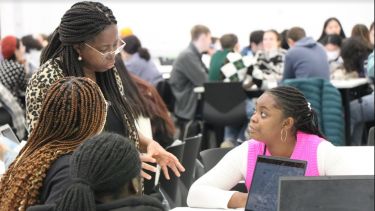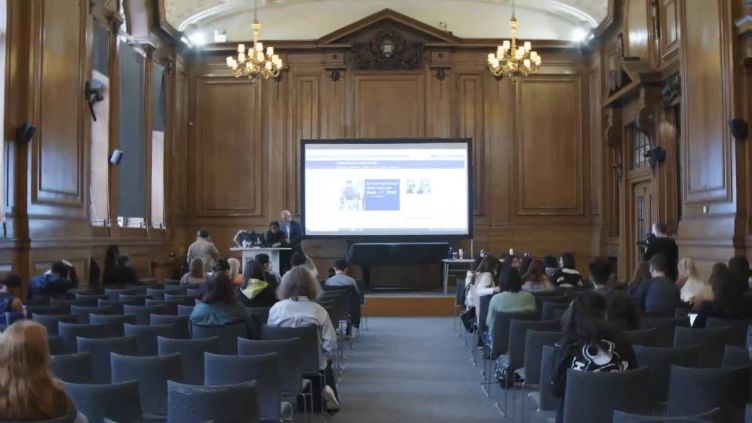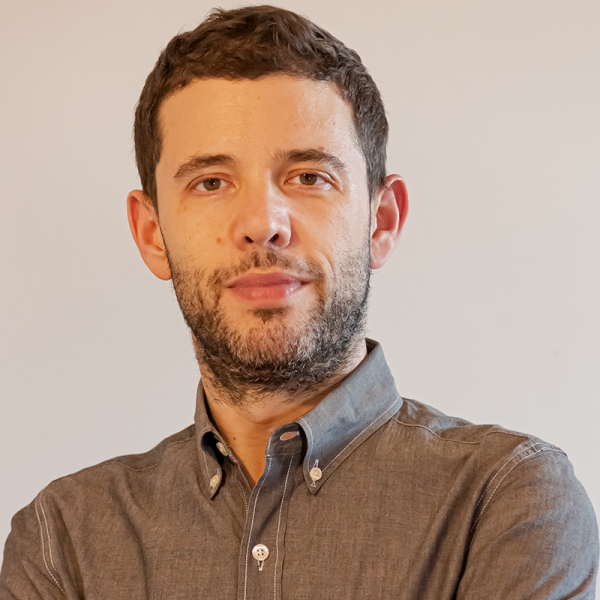Global Journalism MA
School of Information, Journalism and Communication,
Faculty of Social Sciences
-
Start date
September 2026 -
Duration
1 year -
Attendance
Full-time
Explore this course:
Apply now for 2026 entry or join us on a discovery afternoon to see where a Sheffield masters could take you.

Course description
Journalism today is shaped by global forces: digital transformation, new technologies, shifting political contexts, and challenges to press freedom and public trust.
On this course, you’ll explore how journalism operates across borders and cultures, and how it responds to the challenges presented by disinformation, artificial intelligence (AI), censorship, political conflict and inequality.
Alongside critical analysis, you’ll build digital skills that are essential in today’s media landscape. You’ll work with different types of data to analyse news content, audiences and producers, and learn how to interpret and present complex findings clearly. Training in multimedia storytelling will give you the ability to share insights through engaging formats across text, audio, video and digital platforms.
The course places strong emphasis on communication. You’ll practise presenting your own research and ideas to different audiences, whether academic, professional, policy-focused or the general public, and learn how to adapt your work for diverse contexts and platforms.
By the end of the course, you’ll be confident not only in researching global journalism, but also in demonstrating its relevance beyond the classroom.
Modules
Core modules:
- Dissertation
- Digital Journalism
-
This module introduces students to understanding new forms and practices of digital journalism emerging in the data era, including online and multimedia journalism, digital storytelling, data journalism, computational journalism, drone journalism, immersive journalism, social media and mobile journalism, and entrepreneurial journalism. It also discusses the challenges journalism is facing in media markets. It examines the current communication environment and the role of ICTs in shaping journalism and its quality.
15 credits
These topics will be explored through discussing theories and examples from around the world and student-led research projects using digital and data skills for examining various topics about digital journalism.
As such, this module seeks to address the following questions:
What is digital journalism? How does this concept change along with the development of Information Communication Technologies (ICTs)? How are ICTs changing journalistic practices, and with what consequences? What do these changes tell us about the relationship between technology and journalism? What implications are there for the quality of journalism? - Writing for the media
-
This module introduces students to the culture and practice of writing for the media and to some of the practical reporting methods used by journalists. In so doing, it introduces students to some of the key skills required by journalists and media professionals. As this module is an introduction to how journalists prepare and write news stories for the media under stringent deadlines, students will develop basic skills in these areas.
15 credits - Journalism in Britain
-
This module encourages a critical approach to its subject matter and this means questions! Who owned the first million-selling daily newspaper in Britain? What was the impact of broadcast journalism on newspapers? Why has the tabloid genre become so pervasive? Where can we see comparisons and contrasts to the 'British' model? When did journalism emerge as a distinct form of communication? How have women been involved in the development of journalism? What role have news cartoons played within the quality and tabloid press?
15 credits
In order to understand issues and debates within the contemporary British news media, it is best to start with an understanding of how journalism has evolved within this particular national context. How did we get the news media that we have today and what does this mean for contemporary society? This is as important a question whether you are an overseas student, or a student from the UK who has never taken too much notice of the specifics of the news media. Students on this module will learn about the historical development of journalism and current debates concerning the news media in the UK including the evolution of the related field of Journalism Studies. - Global Journalism, Media and Communication Ethics
-
Ethics are fundamental to journalism in all societies. The module aims to introduce and examine diverse, sometimes clashing, theoretical perspectives in media, journalism and communication ethics. Not enough attention is paid to journalism and communication ethics across the world, and the West does not hold the only answers to ethical dilemmas. Students will get an opportunity to consider and debate diverse theoretical perspectives on journalism and media practices. Throughout the module students will examine a range of scholarly approaches to ethics and responses to ethical challenges that may be appropriate in different circumstances and cultures. While this module will not provide students with a set of answers about ethical dilemmas, it will encourage them to engage in a better-informed conversation about ethics and its increasingly vital place in global journalism cultures and practices. The module will help students develop their analytical skills and help them acquire a set of tools they can put to use in ethical reasoning and decision-making in their future professional practice. The module will highlight instances of journalism practice that make a positive contribution to people's lives and explore the relationship between ethical norms and global journalistic practice.
15 credits - Understanding Global News
-
This module surveys the landscape of global news and its intersections with digital technologies, processes of globalisation and the formation of public opinion. You will examine how news content and its creators influence, and are influenced by, global political, social, and cultural trends, with a particular focus on countries in the Global South. The first half of the module focuses on the flow of news across borders, the role of media in building empires and global power structures, and the fine line between news and propaganda. The second half shifts attention to the changing nature of journalism, the actors involved in news production, and the impact of news on social and political change. The module aims to equip you with a solid theoretical foundation to critically evaluate the production and consumption of global news. It also provides you with an introduction to digital tools used in the production of journalistic content.
15 credits - Research Methods
-
This module is designed as an introduction to social scientific research methods as applied in the communications, media and journalism fields. The module provides an overview of key research methods, and the different ways in which research can be conducted. Topics covered include surveys, questionnaire design, focus groups, interviewing, ethnography, content analysis, discourse analysis and different aspects of information search, reserach design, project management and research presentation. The module is designed to make students aware of basic skills in these social science research methods and to equip them to conduct small scale projects on their own, or in groups.
15 credits
Optional modules:
- Journalism and Society
-
The rise of new forms of journalism, the transforming relationship between journalism and audiences in the digital and data era, and the changes in the wider social and political contexts have brought questions about the role of journalism in society.
15 credits
This module will provide students with an academic understanding of the role of journalism in society in the current communication environment and with recent social and political changes. The module will explore issues including the journalism-audience relationship, the influence of social media on journalism, fake news and journalism, journalistic autonomy and legitimacy, the tabloidisation of journalism, tensions between journalism and politics, the rise of partisan journalism, the crisis of objective journalism, and journalism and democracy.
These issues will be explored through academic readings and discussions and student-led empirical/research projects using digital methods and data skills for studying journalism and society. Academic theories, examples, and case studies from around the world will be discussed. - Weaponisation of the media: abuses of the principle of publicity
-
The ideal civil power of the news rests on its ability to influence and be influenced by public sentiment via the news cycle. Traditionally, the news cycle has seen the news mediated by professional editors and journalists operating according to widely held values of truthfulness and accuracy (but not always followed). Recently, news on the Internet and social media have respectively seen the rise of echo chambers and fake news. Both represent fundamental changes to traditional news values and have been likened to the weaponisation of the media. The response to this has been an attempt to return to traditional values in military parlance this represents the de-commissioning of the media.
15 credits - Media freedom: European, UK and US perspectives
-
The overall aim of this module is to develop an understanding of the international treaties and national laws safeguarding the exercise of freedom of expression by the media, the different interpretations of this freedom in Europe and the US, and the limitations to which it is subject. In particular, it aims to facilitate students in developing knowledge of topics including the protection of freedom of expression in the European Convention of Human Rights, the Human Rights Act and the First Amendment; the tensions between media freedom, hate speech and privacy; media freedom and political expression; the contrasting models of press freedom and broadcasting regulation; the debate on internet freedom or regulation. The module seeks to expose students to European, UK and US laws, as well as to other jurisdictions where comparative analysis is appropriate.
15 credits - The Use (and Abuse) of Radio and Digital Technologies in Conflict-Affected Areas
-
Non-governmental organisations (NGOs) and other such organisations are valuable information sources, mediators and actors in conflict-affected zones and use local media, particularly radio, to amplify their messages, programmes and advocacy. This module focuses on, and engages with, the public and political communication used, and sometimes misused, and even abused, by radio and digital technologies, internationally and historically, during times of conflict and the challenges they encounter culturally, politically, economically, legally and institutionally. In this case, 'internationally' means from the perspective of the Global South.
15 credits - Critical Incidents in International Journalism
-
In this module students will explore and analyse international critical incidents (for example, in the UK, US, Asia and Africa) and the efforts to ensure high-quality journalism that follow them. Students will engage in the critical analysis of media reform history, theories and perspectives related to critical incidents in journalism. Additionally, students will have an opportunity to develop their own media reform project and/or participate in an existing one.
15 credits
The content of our courses is reviewed annually to make sure it's up-to-date and relevant. Individual modules are occasionally updated or withdrawn. This is in response to discoveries through our world-leading research; funding changes; professional accreditation requirements; student or employer feedback; outcomes of reviews; and variations in staff or student numbers. In the event of any change we will inform students and take reasonable steps to minimise disruption.
Open days
Interested in postgraduate taught study? Join us on a discovery afternoon to see where a Sheffield masters could take you or register your interest in studying at Sheffield.
Duration
1 year full-time
Teaching
You’ll learn from an international team of academics and journalists who bring their experience and insights from across the world into the classroom. Their expertise ensures that the issues you debate are the same ones shaping today’s news agendas and public conversations.
Teaching in this course is interactive, innovative and inclusive. Alongside lectures and seminars in small groups, you’ll take part in workshops where you put new skills into practice, from data analysis to multimedia storytelling. You’ll engage in debates, experiment with new formats, and experience a newsroom simulation that mirrors the pressures and opportunities of reporting global events.
You will also have the opportunity to attend International Journalism Week, a unique learning activity that brings leading practitioners and guest experts to Sheffield for a full programme of talks and workshops, giving you direct insight into the challenges of contemporary journalism around the world.
Programme lead
Assessment
You’ll build a diverse portfolio through a range of assignments designed to reflect the diversity of skills you’ll develop. These include essays, multimedia content and news stories, giving you the chance to show your ability to research, analyse and communicate in different ways.
You will also complete a dissertation, where you design and carry out your own piece of independent research. From developing your initial idea to completing the final project, you’ll be supported by a dedicated supervisor, who will guide you through each stage of the process.
Your career
Within 15 months of graduation, our students launch straight into roles such as:
- Journalist
- Content Executive
- University staff
- Video director
- Marketer
- Project coordinator
- Brand builder
Many of them find work in private companies, local government, the third sector and news organisations. Workplace destinations include:
- Depaul (Youth Homelessness Charity)
- JD Sports
- FindAUniversity
Find out more about our graduates and where they go on to work.
School
School of Information, Journalism and Communication
Here at the School of Information, Journalism and Communication, we've been training extraordinary journalists and conducting pioneering research since 1994, when our department was launched by Observer Editor Donald Trelford at our first home in Minalloy House.
After 30 years in the industry, we've learnt a thing or two about networking. Study with us, and you'll have exclusive access to our unrivalled contacts and alumni network, situated in newsrooms across the world.
We’ll also provide you with award-winning employability support in the form of one-to-one support sessions, weekly masterclasses and an array of placement opportunities to help you get your foot in the door.
You’ll learn to ace the basics on our practical courses, including how to spot big stories and make them shine; edit engaging audio, video and podcasts in our state-of-the-art facilities; become an expert in social media; and even ace those shorthand exams. We’re the only Russell Group University to be accredited by the NCTJ, BJTC and PPA, so you know you’re learning from the best of the best.
For those with an eye for Journalism’s bigger picture, our research-led programmes will help you piece together the epic social narratives of global journalism, mass media and political communication. You’ll be rubbing shoulders with experts in media law, mis/disinformation, propaganda and freedom of the media - taking full advantage of the research excellence we have to offer as a Russell Group institution.
Our graduates go on to achieve great things and remain part of our legacy forever. They change the world through the power of storytelling - be they journalists, documentarians, PR experts, novelists, or teachers.
Student profiles

I mastered journalism theory by analysing news reports
Siyu Chen
Postgraduate researcher,
Global Journalism MA
Entry requirements
Minimum 2:1 undergraduate honours degree in any subject.
English language requirements
IELTS 6.5 (with 6 in each component) or University equivalent
Other requirements
If you have any questions about entry requirements, please contact the school.
Fees and funding
Save on your course fees
Apply
You can apply now using our Postgraduate Online Application Form. It's a quick and easy process.
Contact
Any supervisors and research areas listed are indicative and may change before the start of the course.
Recognition of professional qualifications: from 1 January 2021, in order to have any UK professional qualifications recognised for work in an EU country across a number of regulated and other professions you need to apply to the host country for recognition. Read information from the UK government and the EU Regulated Professions Database.



